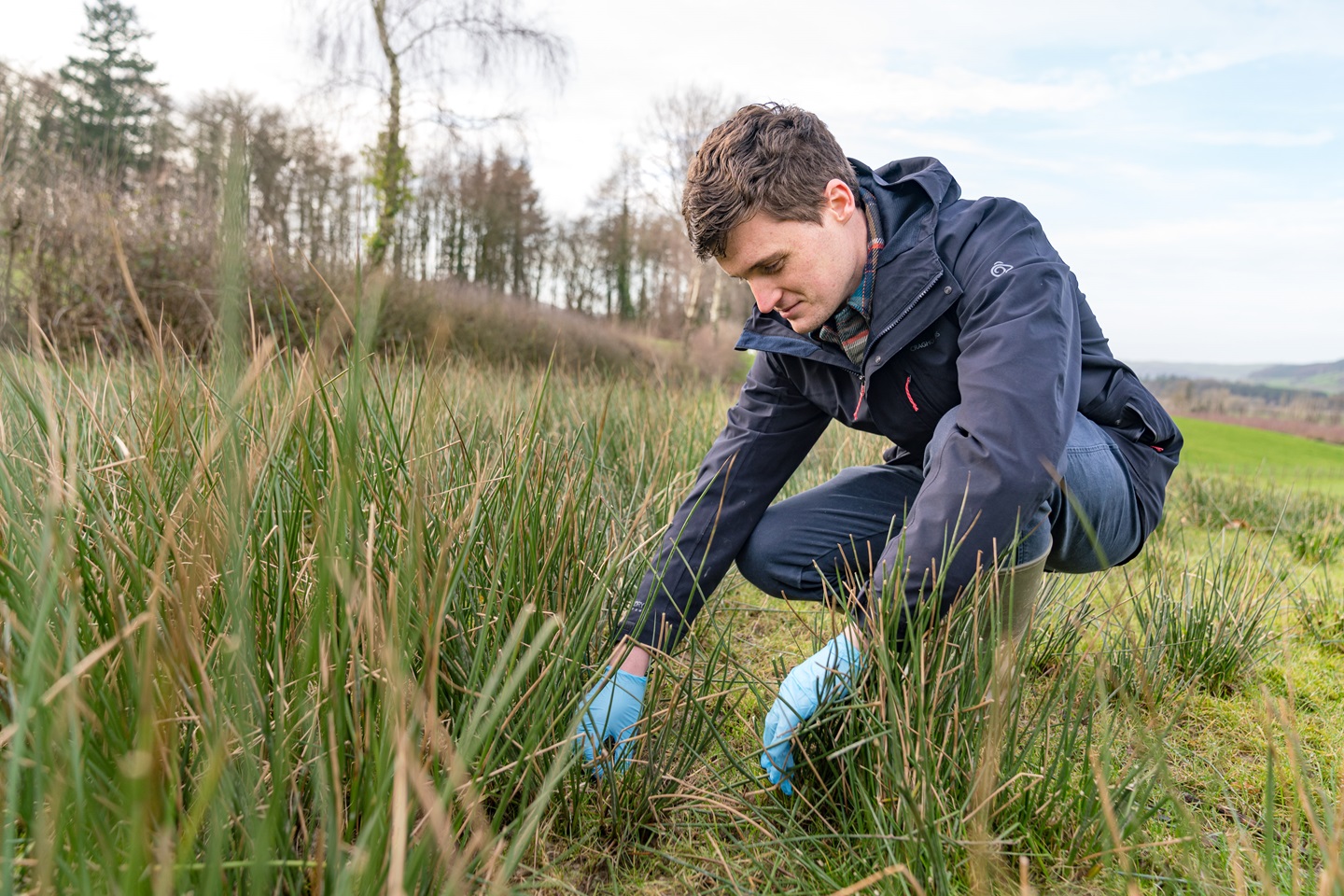Helping farmers tackle major parasitic disease in livestock

Dr Rhys Aled Jones is leading the research project on reducing liver fluke infections in livestock.
23 July 2025
Improved guidance and practical tools are required to help farmers to sustainably tackle the major problem of liver fluke infections in livestock, according to new research.
Scientists at Aberystwyth University have spoken in depth to farmers across Wales and say their early findings show there is a lot of uncertainty around managing this parasitic disease which affects the majority of sheep flocks and cattle herds in the UK.
Infections are believed to cost the UK livestock industry up to £300 million a year in reduced productivity levels, increasing mortality rates and veterinary costs.
In addition, there is growing resistance to the drugs used to treat the disease while changes in the climate are creating more favourable conditions where the parasite can thrive.
As part of a three-year project funded by the Biotechnology and Biological Sciences Research Council (BBSRC), researchers are developing new methods of controlling more effectively the parasitic worm which causes liver fluke.
They are pioneering the use of environmental DNA techniques to accurately detect the presence on farmland of mud snails which acts as an intermediate host between the parasite and livestock.
They are also carrying out close analysis of soil conditions on the farm to identify where the mud snail is most likely to live and thrive.
Principal Investigator Dr Rhys Aled Jones, from the University’s Department of Life Sciences, outlines the potential benefits of the research:
“Our aim is to develop sustainable, innovative strategies and provide farmers with better guidance and practical tools so they are better supported in their efforts to control liver fluke, which has become such a major problem on farms across Wales and the rest of the UK.
“If our research can help to control this parasite more effectively, there will be economic benefits through improved productivity as well as environmental benefits. Liver fluke is a harmful infection so there will be benefits too in terms of animal welfare and ensuring animals are healthy is one of the most effective ways of mitigating the environmental impact of livestock production systems.”
As part of the FlukeMAP project, launched in 2023, the University’s parasitologists and veterinary scientists have been working closely with 16 sheep farmers from across Wales.
Their extensive research has included carrying out in-depth interviews with the farmers, conducting comprehensive surveys assessing infection risks across farmland and monitoring infection levels in grazing sheep.
Several common themes have already emerged from analysis of the interviews and data gathered as part of the project, as Dr Gwen Rees from the Aberystwyth School of Veterinary Science explains:
“Liver fluke is a complicated disease, and the advice available to farmers from vets and industry is mixed and sometimes conflicting. Not surprisingly perhaps, we found there was a lot of uncertainty, with farmers often unsure about how to diagnose, when best to treat, where might be risky for infection and whether they had a fluke problem or not.
“As a result of their uncertainty around disease risk and how best to manage it, farmers often reported needing to use flukicides as a precautionary measure, but this can lead to flukicide resistance as well as medicine residues in the environment.”
Surveys assessing infection risk areas on farms further highlighted areas of uncertainty as Dr Rhys Aled Jones explains:
“Liver fluke risk is typically associated with wet condition. However, the timing and duration of these wet conditions are critical in determining infection risk. Our research also found strong links between soil characteristics, particularly pH and organic matter and the presence of the intermediate mud snail host which transmits liver fluke. These factors were rarely considered by farmers when assessing risk on land and this highlights a clear opportunity for improved guidance to support more accurate risk assessments.
“Accurately identifying fluke risk areas on farms can support more sustainable control strategies. These include optimising the use of diagnostic tests and treatments, and implementing targeted land and grazing management practices to reduce the likelihood of infection.”
Researchers are sharing their latest findings with an audience of farmers and industry representatives at the Royal Welsh showground on Wednesday 23 July).
Funded by the BBSRC and Aberystwyth University, FlukeMAP is a collaborative research project which brings together key partners including Farming Connect, the Welsh Veterinary Science Centre, the Farmers Union of Wales and Ridgeway Research.
Further information about the project is available on the University’s website: https://www.aber.ac.uk/en/rbi/research/research-in-action/helping-farmers-to-fight-liver-fluke/



